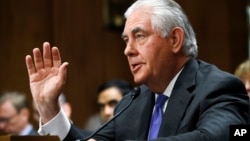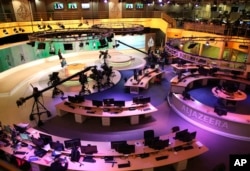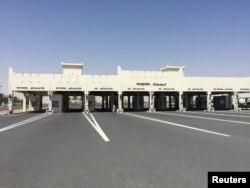U.S. Secretary of State Rex Tillerson said Sunday that it "will be very difficult" for Qatar to meet some of the demands that Saudi Arabia and three of its allies are making on Doha, but urged that they negotiate an end to the Persian Gulf diplomatic standoff.
Tillerson, in a statement a day after Qatar rejected the demands as unreasonable and impinging on its sovereignty, said, "there are significant areas which provide a basis for ongoing dialogue leading to resolution." Tillerson did not say on what issues he thought Egypt, Bahrain, the United Arab Emirates and the Saudis could reach agreement with Doha.
The four Arab governments, which severed diplomatic links with Qatar more than two weeks ago on grounds that it was fomenting terrorism in the region, delivered their demands to Qatar last week through mediator Kuwait. Among other items, the four countries demanded that Qatar shut down the Al-Jazeera television network, long a source of conflict between Qatar and its neighbors.
The four countries also demanded that Qatar end its ties to the Muslim Brotherhood, Islamic State, al-Qaida and Lebanon's Iran-backed Hezbollah movement. In addition, the four Arab governments want Qatar to downgrade links with Iran, turn over opposition figures it has been holding and shut a Turkish military base in the emirate.
Qatar said the demands confirmed "what Qatar has said from the beginning — the illegal blockade has nothing to do with combating terrorism, it is about limiting Qatar's sovereignty, and outsourcing our foreign policy."
Tillerson said that "a productive next step would be for each of the countries to sit together and continue this conversation. We believe our allies and partners are stronger when they are working together towards one goal, which we all agree is stopping terrorism and countering extremism."
The top U.S. diplomat said that "each country involved has something to contribute to that effort. A lowering of rhetoric would also help ease the tension. The United States will continue to stay in close contact with all parties and will continue to support the mediation efforts of the emir of Kuwait."
Middle East Institute scholar Zubair Iqbal says there is a possibility for Qatar to meet some of the demands. But he told VOA there is also a risk in making militant movements more volatile if they are forced underground.
"It's very important to realize that if you do not give flexibility and leeway to organizations like, for example, Brotherhood, then they’re going to react. And when they react they’re going to hurt Emiratis and in particular Saudi Arabia," Iqbal said.











